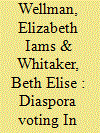| Srl | Item |
| 1 |
ID:
178094


|
|
|
|
|
| Summary/Abstract |
In 2010, Kenya extended voting rights to its estimated 3,000,000 citizens living abroad, thus joining a growing number of countries in Africa and around the world to recognize emigrant voting rights. Yet despite a politically engaged diaspora, intensive government outreach to emigrants, and high-stakes electoral competition, fewer than 3,000 Kenyans were permitted to vote from abroad in the 2013 and 2017 presidential elections. What explains the failure of the Kenyan government to implement diaspora voting on a broader scale? Drawing on original interviews and archival documents, this article analyses the tumultuous battle over the adoption and implementation of external voting in Kenya, focusing especially on legal, logistical, and political challenges. We argue that uncertainty about the number of Kenyan emigrants and their political preferences, paired with a highly competitive electoral climate, meant there was little political will to push for more widespread implementation of diaspora voting. Our analysis of external voting in Kenya has implications for diaspora participation in other competitive electoral contexts across the continent and beyond.
|
|
|
|
|
|
|
|
|
|
|
|
|
|
|
|
| 2 |
ID:
177177


|
|
|
|
|
| Summary/Abstract |
Since 1990, nearly 100 countries extended voting rights to citizens living abroad, including 32 in sub-Saharan Africa. However, the actual ability for emigrants to vote in subsequent elections varies widely. Whereas others view diaspora enfranchisement as a signal to emigrant and international audiences, I argue that incumbent parties expand or restrict emigrant voter access depending on party perceptions of political support abroad. I first leverage the multiple reversals over emigrant inclusion in South African elections since 1994 to illuminate how changing dynamics between an incumbent party and citizens abroad shape emigrant voter access. I further test my argument with an original dataset covering multiple dimensions of external voting in every African election where emigrants had voting rights from 1990 to 2015. I find a robust relationship between emigrant voter access and diaspora support for the incumbent party.
|
|
|
|
|
|
|
|
|
|
|
|
|
|
|
|